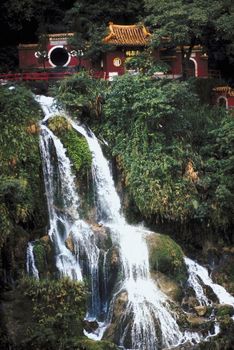
Although a bit expensive, Taiwan provides an ideal place to shift down after retirement. Let us learn about retiring in Taiwan, possibly one of the best places to retire in Asia.
A popular refuge from Mainland China, Taiwan has always attracted people to seek refuge in its beautiful landscapes, ancient temples, and rugged mountains. In addition to the metropolitan area with its dazzling malls and vibrant nightlife, the combination of old and the modern lends an interesting facet to Taiwan where, instead of blending with each other, they simply co-exist.
The capital city of Taipei offers many entertainment facilities where you can croon in one of the karaoke bars or spend a weekend in one of the world-class hotels that provide comfort and service which are on par with the highest international standards.
Cost of living
With the standard of living constantly improving in Taiwan, the cost of living has increased proportionally, making it one of the world’s most expensive places to live in. Estimates say that the average cost of living in Taiwan may equal up to US$800 per month. However, it is still lower than many of the other countries of Asia. As of this writing, one United States Dollar is the equivalent of NT$32. If you are comfortable in eating at the local food stalls and noodle stands your average expenditure on food should be approximately between NT$150 to NT$300 (New Taiwan Dollar) per day ($4-$12 U.S.). If you prefer western watering holes or fancy restaurants, then you may need to spend a lot more.
Affordable Housing
Although the price rates of Taiwan’s real estate sector is on the rise in keeping with the improvement and growth of the general living standards, it is still cheaper to buy a house in Taiwan as compared to New York or other major American cities. The rates are cheaper as compared to some of the Asian countries as well. Additionally, past natural disasters has affected the price rates of the real estate sector, making it even more affordable to own a decent or even lavish house in Taiwan.
Food

You may also opt for lunch boxes costing between NT$50 to NT$70 (around $2.00 U.S.), containing rice, a couple of vegetable side dishes and a main meat dish. Pre-cooked meals are also available in supermarkets and at most of the convenience stores in almost same price range. A bowl of noodles cost NT$30 to NT$40 at the noodle stalls. Alternatively, you may also opt for McDonalds and KFC, found widely all over and costing around NT$100 to NT$150 per meal. While a moderate food expenditure might cost you around NT$200, the price ranges of fine cuisine can shoot up to $NT1000 ($30 U.S) – still relatively inexpensive.
Transportation
With a fully integrated transportation system, Taiwan offers a wide network of railways, highways and freeways, airports and rapid transit, including harbors and shipping facilities.
Railways
Convenient and frequent passenger service is provided by a modern railway system between all the major cities of the island. Statistics say that as of December 2005, the total distance covered by the railway network of Taiwan measured up to 1097 kilometers.
Highways and Freeways
The major highways and freeways of Taiwan are congested frequently, especially on holidays and weekends. These roads handle a majority of the traffic between the different cities of Taiwan. Aside from cars, scooters are one of the most popular means of transportation, offering a quick and cheap way of moving around the island. Bicycles can be an even cheaper alternative. Public transport by buses is another cheap travel option. The cost of gasoline or petrol in Taiwan comes up to NT$18 to NT$20 (61 cents U.S.) per liter.
Air
The two major International Airports of Taiwan are the Chiang Kai-shek International Airport and the Kaohsiung International Airport. Aside from these two, 15 more local airports serve Taiwan by domestic flights. Some of the major airlines serving these airports include Mandarin Airlines, China Airlines, Far Eastern Air Transport Corporation, UNI and EVA Airways Corporations, just to name a few.
Rapid transit
The Taipei Rapid Transit System (TRTS) began in 1986 and was completed by the year 2000. The Rapid Transit System facilitates speed and a comprehensive mass transportation network.
Harbor and shipping
There are six International harbors in Taiwan located in the different cities of Anping Taichung, Keelung, Hualien, Suao and Kaohsiung. Shipping plays an integral role in the economy of Taiwan, which is mostly trade oriented.
Medical Facilities
Taiwan is served by an extensive network of clinics and hospitals, with around 480 clinics and 93 hospitals serving the public medical care institutions. These institutions include medical school hospitals, civil departments of the military hospitals, veterans’ hospitals and government-affiliated clinics. According to statistics, a combination of public and private hospitals and clinics reached a number of 18,228 at the end of 2005. These medical Institutions provided 136,331 long and short-term beds with an average of 60.31 beds for every 10,000 people. Among these, private medical institutions provide almost 68% of the beds.

Taiwan is a very attractive place for American retirees to relocate. It’s ease of transportation, modest living expenses and well-developed infrastructure make Taiwan the ideal place to spend retirement. Many consider it one of the best places to retire in Asia.
You can learn more about how to retire in Taiwan if you choose by checking out more resources below:
Taiwan currency exchange 1.00 USD = 29.4918 TWD Taiwan New Dollar (April 2012)
1.00 USD = 29.4918 TWD Taiwan New Dollar (April 2012)
1.00 EURO = 38.8892 TWD Taiwan New Dollar (April 2012)
http://wikitravel.org/en/Taiwan
http://www.state.gov/r/pa/ei/bgn/35855.htm
https://www.cia.gov/library/publications/the-world-factbook/geos/tw.html
